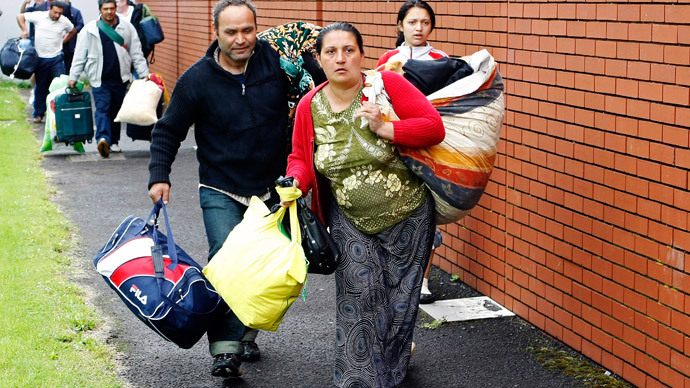UK benefits to be accessible to EU immigrants earning €180 per week

The British government plans to implement a new requirement for EU immigrants before they can claim benefits: they must prove they have been earning at least £149 (€180) a week for three months. Brussels says the requirement is not compatible with EU law.
The plans, which were reaffirmed by Work and Pensions Secretary Iain Duncan Smith, will come into force on March 1.
"These reforms will ensure we have a fair system - one which provides support for genuine workers and job seekers, but does not allow people to come to our country and take advantage of our benefits system,” Smith said.
Those who do not meet the threshold will have to undergo a fuller assessment on whether the work they are doing is "genuine and effective,” he added. They will also have to wait a further three months before becoming eligible for Jobseekers' Allowance or claiming housing benefits.
The amount of £149 a week is the level at which people start paying a National Insurance Contribution. An EU migrant who has been earning above this figure will be eligible for Jobseekers Allowance, child tax credits, child benefit, and other benefits.
The plan to assess European Economic Area (EEA) immigrants by the benchmark was first announced by Prime Minister David Cameron last year. The figure will rise to £153 in 2014-15.
Cameron had been under pressure from his own Conservative MPs to take action before work restrictions were lifted for Romanians and Bulgarians on January 1.
Welfare Minister Esther McVey said the measure would “protect the integrity” of the welfare system.
“These are not measures about saving money. This is about protecting the integrity of our benefits system and having clarity about the benefits system,” she told BBC Radio 5 Live.
Ministers of the coalition government have argued that the principle of the common market, in which citizens of the 27 EU countries should be allowed to live and work in other member states freely, has nothing to do with an automatic right to claim benefits abroad.
They argue that it is now too easy for migrants from Europe to access public services in the UK such as the welfare system and the National Health Service (NHS), which are already under increased stress from the coalition’s austerity cuts.
A spokesman for the European Commission told The Telegraph that EU law states that a worker is someone who carries out “genuine and effective work under the direction of someone else,” regardless of the amount they are paid.
“The Court of Justice’s case law makes clear that part-time workers, trainees and au pairs can be classified as ‘workers’, provided their activity has an economic value and is genuine and effective. This case-law makes clear the definition of a worker according to the amount he or she earns is not compatible to EU law,” the spokesman said.
The announcement comes as the prime minister rejected a claim by Archbishop of Westminster Vincent Nichols on BBC’s Today program that the government’s welfare reforms are “seriously wrong” and leave vulnerable people destitute.
Cameron defended his government’s welfare changes, saying that they are part of his moral mission to give people “new hope and responsibility.”












